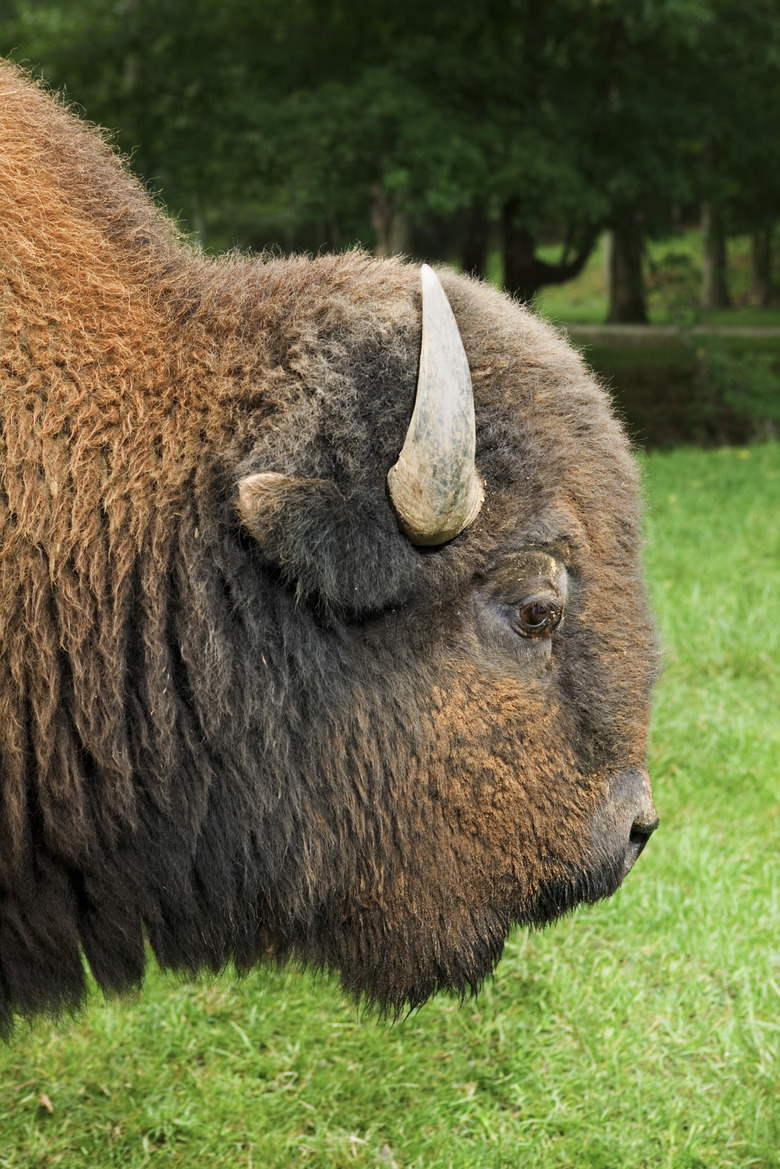How Do The Extinctions Of Other Creatures Affect Humans Directly?
While extinction of animal species is part of the natural process of evolution, the expansion of the human species has led to significant increases in the extinction rate. Because humans share ecosystems with endangered species, our quality of life and our survival is linked to them. Habitat destruction, climate change, resource depletion and other factors have increased the extinction rate by a factor of 1,000, putting substantial pressure on thousands of the most vulnerable creatures on the planet.
American Bison
American Bison
One example of how the depletion of a species affected humans is what occurred after the American bison nearly vanished in the 19th century. Originally, the bison was a common animal on the central plains, with an estimated population of 15 million, and the Native Americans of the region depended on the animal for food, leather, fur and many other goods vital to a nomadic lifestyle. By 1890, however, there were only a few thousand bison left in America. Tribal hunters were able to kill more of the animals with the aid of firearms, and in some cases the United States government encouraged the widespread slaughter of bison herds. The vanishing species forced tribes dependent on the animal to move to new lands in search of food, and eventually those tribes could no longer support themselves and had to deal with the United States government for survival.
Bees and Pollination
Bees and Pollination
Another species under threat that humans rely on is the common honeybee. Bees are responsible for pollinating more than 250,000 species of plants. However, a malady known as "colony collapse disorder" has wiped out entire populations of the insect, and scientists have yet to discover its true cause. Dwindling bee populations have already forced some growers to import colonies to their fields in order to keep yields up, and continued losses could threaten the supply of crops like almonds, apples and cucumbers. Of the different varieties of crops humans rely upon for food worldwide, 87 rely on pollinators, mainly honeybees, while only 28 different crops could survive without such assistance.
Disease Vectors
Disease Vectors
Some species serve as buffers between humans and pathogens that could prove extremely dangerous. The common opossum is resistant to the parasites that cause Lyme disease, but human development and other factors have seen their numbers dwindle in the United States. Other species that have moved in to fill their ecological niche have less resistance to the disease, and as a result, the incidence of Lyme disease among humans in these regions has increased. In some areas of the United States, the incidents of Lyme disease has increased by about 30 percent in the past 20 years. Scientists have also discovered links between the incidence of West Nile virus and hantavirus and local reductions in biodiversity.
Medical Studies
Medical Studies
Animal extinctions may also rob humans of valuable medical advancements. Many different species have unique bodily processes that can offer insight into curing human disease. The toxins produced by dart-poison frogs in the rain forest, for example, have yielded invaluable information about how alkaloid compounds behave in living organisms. Scientists also study bears for clues about how they recycle blood toxins during hibernation to find potential solutions to kidney disorders. Each species that vanishes may hold the key to any number of medical breakthroughs, and the loss of these resources could prove a terrible blow to humans.
References
- The Telegraph: Earth Heading Towards Another 'Mass Extinction'
- The Guardian: Why Bees Are the Most Invaluable Species
- Scientific American: Humans Are More At Risk from Diseases As Biodiversity Disappears
- The Odyssey Online: What Happened To The Bison In The 19th Century?
- Natural Resources Defense Council: Would a World Without Bees Be a World Without Us?
- Science: Lyme Disease–Carrying Ticks Are Now in Half of All U.S. Counties
Cite This Article
MLA
Kazmeyer, Milton. "How Do The Extinctions Of Other Creatures Affect Humans Directly?" sciencing.com, https://www.sciencing.com/extinctions-other-creatures-affect-humans-directly-20692/. 9 March 2018.
APA
Kazmeyer, Milton. (2018, March 9). How Do The Extinctions Of Other Creatures Affect Humans Directly?. sciencing.com. Retrieved from https://www.sciencing.com/extinctions-other-creatures-affect-humans-directly-20692/
Chicago
Kazmeyer, Milton. How Do The Extinctions Of Other Creatures Affect Humans Directly? last modified March 24, 2022. https://www.sciencing.com/extinctions-other-creatures-affect-humans-directly-20692/
